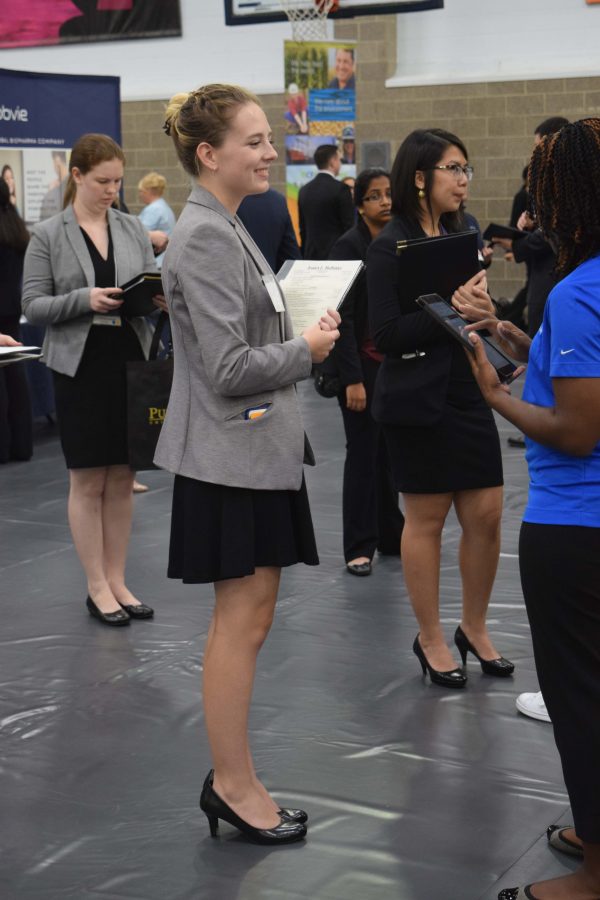Preparing for career fairs is important
A student engages with a potential employer at the ACES Career Fair at the ARC.
Jan 30, 2017

With so many students attending career fairs at the University, employers don’t have time for those who come unprepared.
Being prepared can mean many different things when it comes to career fairs, from wearing the right thing to simply practicing your elevator-pitch.
All of these small preparations add up to not only boost your confidence when walking into the job arena, but also to elevate your chances of landing a job.
I am a conservative person when it comes to professional attire because I know that the classics never go out of style, with a few exceptions (plaid suit, I’m talking about you).
Get The Daily Illini in your inbox!
I went with the all-black suit, white button-down shirt, black dress shoes, and a minimally-patterned blue tie. You can veer from this traditional look, but just have common sense about it.
When you walk into the career fair, you will see a sea of black and navy blue, but, like I said, don’t feel restricted to just those choices if you’re feeling individualistic. In fact, your clothes can have the ability to set you apart from the rest of the crowd and make you more memorable.
Though your clothing choice for the career fair is important, this isn’t a fashion show.
Everyone is there in one way or another to get a job and establish connections. In order to expedite this process, it is imperative to have a polished and updated resume to distribute liberally at the career fair. This means you should have a number of printed resumes at your disposal and something to hold them in—preferably a black leather resume portfolio holder.
That is the extent of what you need to bring with you physically, but with regards to actual preparation for the career fair, there is much more that needs to be done.
First, it is important to go to the website of the career fair you are attending and find the list of companies that will have booths.
Figure out which ones you will definitely want to talk to, and do some research. Find out what positions they are offering, learn more about the companies, and be prepared to ask lots of insightful questions.
It’s perfectly acceptable to wander around to other companies as well, but you don’t want to sound disinterested or unprepared at those either.
In order to avoid this, try to at least find out what the company does, and then be determined to express interest in finding out more when talking to them.
Even if they aren’t offering a position applicable to you, give them a resume and try to establish a connection for future reference.
The elevator-pitch is a short 20-30 second introduction meant to give the employer or company representative an idea of who you are, what you do and why you’d be an ideal candidate.
It is also the first impression that the company gets of the prospective employee, so the delivery is just as important as the actual content of the speech.
It is essential to practice this speech before implementing it at a career fair. Find a mirror and fine-tune your pitch so that you exude confidence and sufficiently sum up yourself.
The best pitches are the ones that persuasively sell the student without actually sounding like they are trying to sell the employer anything.
I attended the business fair last semester, and I was prepared in some aspects, but unprepared in others, which led to an inconsistently successful experience.
I hadn’t practiced my elevator pitch to a point of unconscious mastery, which led to me sounding competent to some employers and a little lost to others.
I also hadn’t anticipated the long lines at some very popular companies so I felt pressed for time during my conversations and it may have shown.
Even for the career fair veterans who have been going for years, there are always improvements to be made and valuable lessons to learn.
The best that you can do is to prepare until you are fully confident in your ability to network and sell yourself.






